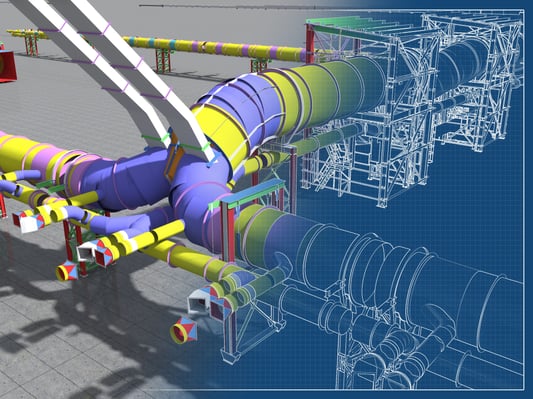Building information modeling, or BIM, is an innovative method for designing and managing construction projects. This collaborative method allows professionals and clients to interact more efficiently, leading to better design decisions. BIM is not just a powerful tool during design and construction; its benefits extend throughout the lifespan of a building.
This article summarizes the main benefits of BIM, both technical and administrative.
Reduce construction costs and improve construction performance with BIM.
Collaboration and Communication
A digital BIM model allows for a degree of collaboration that is not possible with normal 2D drawings. With the help of cloud-based tools, BIM collaboration can easily occur between different engineering disciplines, regardless of distance.
With BIM, all teams on a project use the same information and work with a single model. This eliminates the hassle and confusion caused by different file versions. Another benefit is that templates can be accessed anywhere with mobile devices. Therefore, all stages of a project's life cycle can be managed in the cloud.
Better visualization and enhanced reality
BIM can capture all the details of a project, something that is not possible in two dimensions.
- 3D visualization, augmented reality and simulations give clients a clear perspective of the project.
- Clients understand how the space will be used before construction begins. Necessary changes that are not evident in the designs can be detected.
- Having an improved picture of the project from the beginning prevents costly and time-consuming future changes.
Confrontation Detection
Having a location conflict between two elements during the construction phase of a project can be costly and time-consuming. For example, if an air duct crosses a plumbing line, one of the two systems must be modified. BIM automatically detects MEP conflicts before construction begins, notifying designers so they can correct the problem. Detecting location conflicts during the design phase can save thousands of dollars during construction.
Cost Estimation
BIM files contain geometric and technical information for all construction systems. When this is combined with pricing data, cost estimates can be automated. This concept is called 5D BIM, where 3D models are combined with technical specifications and cost data.
Instead of performing repetitive, time-consuming calculations, estimators can focus on optimizing project costs. Design changes and price modifications are reflected in the quote automatically, without repeating calculations.
Simplified Prefabrication
BIM can be used to generate production drawings for manufacturing, promoting prefabrication and modular construction. As we've discussed in previous articles, prefabrication improves efficiency and reduces waste while reducing labor and materials costs.
Safe construction sites
BIM improves construction safety as hazards are easier to identify in a 3D model. The risks are most evident when the construction model gives a clear picture of the work environment. On the other hand, a 2D drawing requires more imagination to visualize the project location. A person responsible for construction safety can create better risk management strategies after a “step-by-step” of the project in virtual reality.
Improved Planning: Step-by-Step Process

When using BIM, each stage of design and construction is fully coordinated between all parties involved. Step-by-step instructions can be created for technical personnel, complete with 3D snapshots of the work they must perform. With each step well documented and accessible, oversight and reviews can be completed more efficiently. Also consider that all data is available in the cloud.
Speed and cost-benefit
When working with BIM models, everything is connected to a cloud database. This means that any change to the model is reflected on all devices connected to the database. BIM software also notifies users when changes are made. As a result, engineers working in other areas can easily track changes they missed. These benefits save time and money by reducing repetitions and other issues that delay the project.
Sustainability
Sustainability is a key component of the BIM design process. Design engineers can perform better environmental analysis, exploring aspects such as building orientation, energy use and natural light. BIM can help find the best strategies for energy efficiency, waste management and water conservation. There is also an opportunity to reduce paper use during design and construction with cloud computing and collaborative processes.
Continuity
BIM supports the entire lifecycle of a building, as a virtual model provides a detailed snapshot of the property's condition. Material and labor costs are not only optimized during construction, but also during maintenance and renovations.
BIM files can store the complete history of a project. An accurate digital record of building information is valuable for facilities managers and maintenance personnel. Additionally, data can be easily transferred to new occupants if a building is sold or rented.
Better build quality
By using BIM, design decisions can be tested in virtual reality. For example, natural lighting can be modeled to optimize the location of windows and skylights. Reality capture technology can then be used during construction to further improve accuracy. Overall, BIM provides a series of tools that simplify design and construction, resulting in better-looking, higher-quality buildings.
Building Information Modeling offers several benefits to construction companies and their clients. Projects that use BIM have a greater chance of success and are better managed throughout their life cycle.

